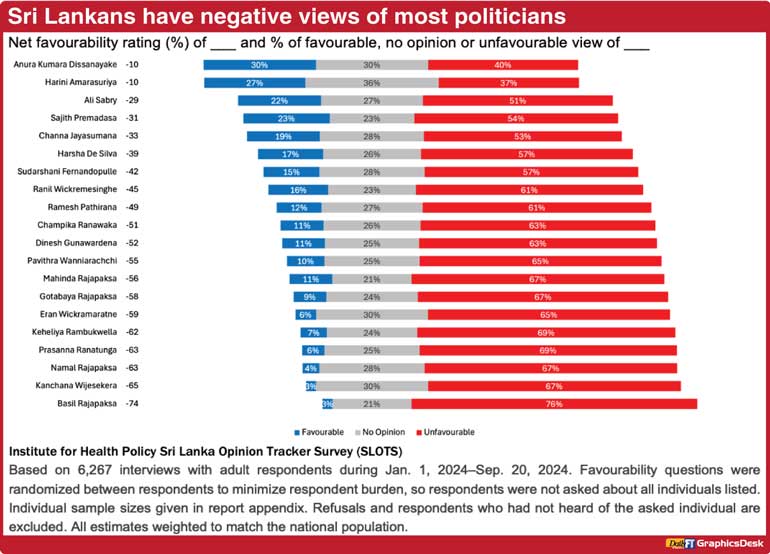Wednesday Feb 18, 2026
Wednesday Feb 18, 2026
Saturday, 12 October 2024 01:33 - - {{hitsCtrl.values.hits}}

In The Institute for Health Policy (IHP) Sri Lanka Opinion Tracker Survey (SLOTS) polling through 2024 prior to the Presidential Election, AK Dissanayake, Harini Amarasuriya, and Ali Sabry were consistently the most popular politicians tracked.
After AK Dissanayake, Harini Amarasuriya was the next most popular, suggesting she will be a popular choice for the PM post.
Overall, Sri Lankans still held unfavourable views of all politicians tracked by SLOTS, with most having
net favourability ratings below -30%. AK Dissanayake and Harini Amarasuriya had net ratings of -10%, and Ali Sabry and Sajith Premadasa followed with net ratings of -29% and -31% each.
Ali Sabry had the highest favourability rating of all SLPP politicians that SLOTS tracked, suggesting that his retirement from Parliament may be a loss for his party.
Most politicians tracked were deeply unpopular having net favourability ratings less than -50%, with members of the public having unfavourable views typically outnumbering those with favourable views five to one. In general, professionals such as Ali Sabry, Harsha de Silva, Dr Sudarshini Fernandopulle, and Professor Jayasumana tended to have higher favourability ratings than other politicians.
The most unpopular politicians tracked during the year were Basil Rajapaksa (-74%), Kanchana Wijesekera (-65%), Namal Rajapaksa (-63%), and Prasanna Ranatunga (-63%).
IHP tracked the favourability of 20 active politicians during the year, consisting of recent Presidents and Prime Ministers, major party leaders, current and recent health ministers and selected other MPs. The list is not intended to be exhaustive, and it’s possible that more popular politicians were not tracked. All favourability estimates are weighted for age, gender, ethnicity, province, income ranking, education and sector to match the national population.
This analysis uses data collected by the Sri Lanka Opinion Tracker Survey (SLOTS) between January 1, 2024 and September 30, 2024. SLOTS is a national phone survey that has been tracking public opinion every day since August 2021, interviewing people across the country. Respondents are drawn from a mixed sample of a national representative panel of respondents previously recruited in 2019 through face-to-face interviews from all parts of the country, and others reached by randomly dialling mobile numbers.
Respondents are interviewed in their language of choice: Sinhala, Tamil, or English. The specific question about favourability is worded as follows: “Can you tell me whether you have a favourable or unfavourable view of ______ — or that you are unsure or have no view of [it], or that you have not heard of [it].” When interviewers read out the possible responses, the ordering of “favourable” and “unfavourable” is randomised between respondents to minimise bias. The specific individual or institution that respondents are asked their opinion about are randomised between respondents, so no respondent is asked about all items.
All reported results are weighted to be representative of all Sri Lankan adults by age, gender, ethnicity, religion, household socioeconomic status ranking, education, and province. The household socioeconomic status ranking of respondents is based on a wealth index computed from ownership of household assets, which is calibrated to match the overall national distribution of assets including households without phones.
Weights are trimmed at the 2nd and 99th percentiles to reduce the loss in precision stemming from variance in the weights. The SLOTS survey cannot reach adults living in households without phones, but the weighting adjustment by socioeconomic status and province substantially compensates for this.